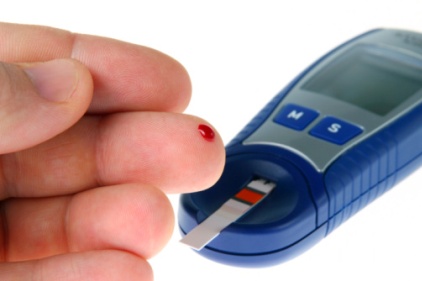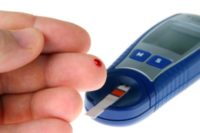For National Diabetes Month, NIH urges actions to reach health goals

 Statement of NIDDK Director Griffin P. Rodgers for National Diabetes Month, World Diabetes Day:
Statement of NIDDK Director Griffin P. Rodgers for National Diabetes Month, World Diabetes Day:
In observance of National Diabetes Month, including World Diabetes Day on Nov. 14, the National Institutes of Health (NIH) urges people to take action and make simple but important lifestyle changes to achieve their health goals — whether they have diabetes or are at risk for the disease.
Nearly 26 million Americans have diabetes. In type 1 diabetes, the body does not make insulin. People with type 1 need to take daily insulin to live. In type 2 diabetes — the most common type, which has risen in incidences along with the obesity epidemic — the body does not make or use insulin well. People with type 2 may need to take pills or insulin to manage the disease. A third type, gestational diabetes, occurs in some women during pregnancy. It usually goes away after the birth, but these women and their children have a greater chance of getting type 2 diabetes later in life.
Left untreated, diabetes can lead to serious complications, such as heart disease, stroke, kidney disease, blindness and amputation. An estimated 79 million adults have prediabetes, a condition that places them at increased risk for developing type 2 diabetes and heart disease.
The landmark Diabetes Prevention Program, led by the NIH's National Institute of Diabetes and Digestive and Kidney Diseases (NIDDK), found that people with prediabetes can reduce their risk for type 2 diabetes by more than half. The ongoing TrialNet study screen thousands of relatives of people with type 1 diabetes every year and conducts prevention studies to help learn how to predict and reduce the incidence of type 1 diabetes in this population. These are only two examples among many of research that has the potential to change — and save — lives.
Through research, we have the tools to help prevent type 2 diabetes and diabetes-related complications. As stated in our Sept. 27 Perspective in the New England Journal of Medicine, our challenge now is to move proven research into health care practice nationwide. We know that certain interventions could prevent or substantially delay the onset of type 2 diabetes safely and cost-effectively. As well, research has shown that good diabetes control started soon after diagnosis can help prevent complications and help people with diabetes lead healthier, happier lives.
In his proclamation recognizing National Diabetes Month, President Obama acknowledges that there are actions we can take for better health. His administration remains committed to changing the way diabetes is treated and advancing public health through diabetes education, research, prevention and treatment.
To help people get started on improving their health now, the National Diabetes Education Program (NDEP), an initiative of the NIH and the Centers for Disease Control and Prevention, is working to assist people in making positive, lasting changes to improve their health. NDEP’s Just One Step resource can help people start this process by identifying one small step that they can take to make a change to improve their health. Once people have taken that first step, NDEP’s Make A Plan tool can help with making these changes stick as part of a daily routine to support them in reaching their health goals.
The NIDDK's National Diabetes Information Clearinghouse (NDIC) supports the NIDDK mission by developing and promoting research-based health information and campaigns for the public. Among many publications, Am I at Risk for Type 2 Diabetes? helps people understand and lower their likelihood of getting type 2 diabetes. The A1C Test and Diabetes explains an important test of a person’s average level of blood glucose and how the test can help with diagnosis and management of diabetes.
Looking for a reprint of this article?
From high-res PDFs to custom plaques, order your copy today!





